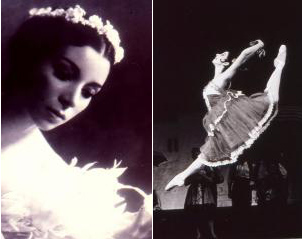
Magda Saleh, “Giselle”, Studio Portrait, Cairo, Egypt, 1968, left; Magda Saleh in “Don Quixote”, Guest Artist, Bolshoi Ballet, right
Panel Discussion: Dancing Culture and Controversy: Professional Women Dancers of the Arab World
Monday, June 4, 2012 6:30 pm at Alwan for the Arts
Join renowned professional dancers Magda Saleh of Egypt, Leila Molaei of Arab-Iranian descent, and dance anthropologist Najwa Adra, for a panel presentation and discussion on women professional dancers of the Arab world and diaspora.
Dance by women is the most controversial of all performance arts, because it is the body, the basis for construction of gender difference, which creates it. Traditional or culturally specific dances especially embody cultural ideals and taboos related to the female body.
Panel Discussion 6:30-8:30
$5 at door (Free for members.)
Magda Saleh will share vignettes of her trailblazing career path of classical dance, becoming Egypt’s beloved Prima Ballerina with the Cairo Ballet Company. She will also present footage of her 1979 documentary film, “Egypt Dancesâ€, highlighting women performers of Egyptian traditions such as zar, haggalah and others.
Leila Molaei, expert performer and teacher of raqs sharqi, Iraqi kawleya, and one of a handful of Arab professional dancers of these forms in diaspora, will speak to how she negotiates cultural challenges of performing female solo dances. Leila will also discuss gender issues in performance of dances such as kawleya and khaleegy, including demonstrations of relevant technique and issues such as costuming and context.
Leila will also be teaching a workshop on Iraqi dance and performing in NYC, presented by Mark Balahadia. For more information on the May 31 show, or June 2 & 3 workshop, visit www.markbalahadia.com.
Najwa Adra, cultural anthropologist specializing on dance in the Middle East region will serve as the panel respondent.
About the Artists:
Magda Saleh
Magda Saleh is a graduate of the Bolshoi Academy of Ballet in Moscow and the Higher Institute of Ballet at the Academy of Arts of Egypt. She holds a B.A. in English Language and Literature, Ain Shams University, Cairo; an M.A., University of California at Los Angeles; and a Ph.D. from New York University School of Education. Magda Saleh was Prima Ballerina of the Russian-trained Cairo Ballet Company established in 1966, Senior Professor and Dean of the Higher Institute of Ballet and Founding Director of the New Cairo Opera House – National Cultural Center.
Magda is also the recipient of scholarships, awards, honors and distinctions, including the Order of Merit from President Gamal Abdel Nasser. She has been a member of the Conseil International de la Danse and the International Theater Institute, UNESCO, of the jury of international ballet competitions, the National Specialized Councils, Egypt, among other national and international associations.
Currently a resident of New York, and married to Egyptologist Jack Josephson, she remains dedicated to promoting cultural exchange and furthering mutual understanding between the USA, Egypt and other nations of the Middle East.
Leila Molaei
Of Arab-Iranian origin, Leila Molaei has been performing, as well as training students in Arab dance since 2005. Based in the United Kingdom, she runs Layali Academy, one of the busiest Arab dance schools in London covering the dances of Egypt, the Levant and the Arabian Gulf. One of the only natives of Iraqi and Gulf dance in the UK and popular amongst the UK Arab community, Leila has been invited to teach and perform Iraqi kawleyadance at various conferences and workshops in the UK and abroad. Her aim is to preserve and promote the roots of Arab dance, and this feeling is conveyed in her performances.
Najwa Adra
Najwa Adra is a cultural anthropologist who specializes in the links between dancing and culture in the Middle East. She has conducted field research on dancing and tribal values in Yemen since 1978. Her publications include, “Belly Dance: An Urban Folk Genre,” published in Shay and Sellers-Young’s Belly Dance: Orientalism, Transnationalism, and Harem Fantasy, 2005. She is currently completing an ethnography of dancing in Yemen’s northern highlands. Her experience with dancing is not only academic, however. Dancing was an integral part of social occasions during her childhood in Baghdad; sometimes this meant ballroom dancing and at other times, belly dancing. www.najwaadra.net